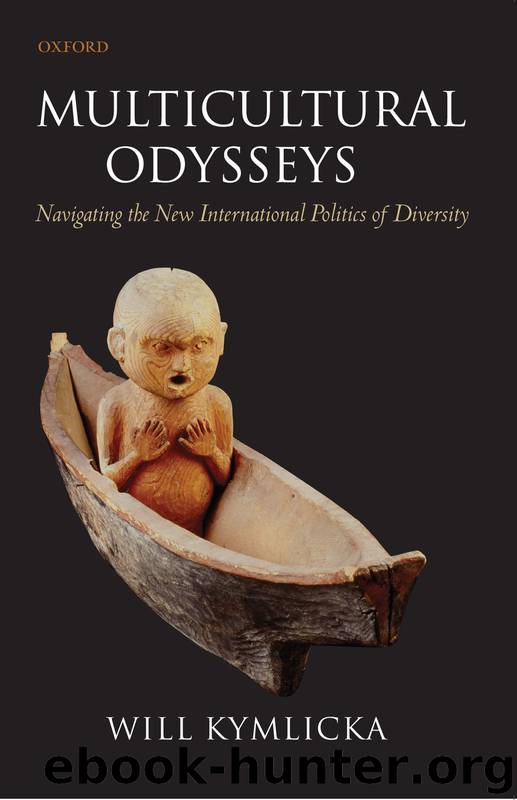Multicultural Odysseys by Kymlicka Will;

Author:Kymlicka, Will;
Language: eng
Format: epub
Publisher: Oxford University Press USA - OSO
Published: 2007-02-23T16:00:00+00:00
From ‘Norms’ and ‘Standards’ to Conflict Prevention/Resolution
It seems then that neither of the two strategies I have looked at so far has effectively addressed the problem that originally inspired European action on minority issues—namely, fears about the destabilizing effects of ethnic conflict in post-communist countries. The strategy of publicizing Western best practices naïvely ignored the fact that the underlying conditions needed for those practices to be adopted are missing in much of the region; and the strategy of formulating legal norms did not address the actual issues at stake in the conflicts.
So what then have European organizations done to prevent and contain destabilizing ethnonationalist conflicts? As I noted earlier, ethnonationalist conflicts in the post-1989 era threatened to undermine regional peace and stability, with spillover effects on neighbouring countries. The international community’s decision to ‘do something’ about minority issues was premised on the need, and indeed the duty, to protect Europe against such potentially destabilizing ethnic conflicts. If the first two strategies failed in this regard, what then has been done?
The answer, as I’ve already hinted at, has been to engage in ad hoc, country-specific interventions. In several countries experiencing violent ethnic conflict, or where such conflict seemed imminent, European organizations have been actively involved in mediating negotiations between governments and minority leaders, and in making proposals for how their disputes should be resolved. Indeed, in some cases, European organizations have essentially drawn up the terms of a possible resolution, and then pressured both states and minority leaders to accept these Western-drafted agreements.67
For example, European organizations played a key role in drafting the terms of the Ohrid Agreement in Macedonia, granting official language status and greater local powers to the restive Albanian minority, and then pressured the government to accept it (which it did, in order to maintain NATO military support).68 Western organizations also helped draft the Dayton Agreement in Bosnia, creating a structure of regional autonomy and consociational power-sharing for the Bosnian Muslims, Serbs, and Croats, and then pressured the parties to accept it (which they did, in order to avoid NATO military sanction). Another example, although not from a post-communist country, is in Cyprus, where the UN essentially drafted a new constitution (the Annan Plan), in cooperation with European organizations, proposing federalization and consociational power-sharing as a means to overcome the long-standing conflict between the Greek majority and Turkish minority. (Despite enormous pressure from the EU, this draft was rejected by the Greek majority in a referendum.)
In all of these cases, European organizations were actively involved in drafting agreements to resolve past violent conflicts (Cyprus), ongoing violent conflicts (Bosnia), or prospective violent conflicts (Macedonia). And in each case, quite substantial minority rights guarantees were included, going far beyond the minimal provisions of pan-European legal standards on minority rights such as the Framework Convention. But precisely because these minority rights provisions are case-specific, and not based on pan-European standards, there is no consistency in approach across different countries. These country-specific interventions are not derived from any common set of standards.
Download
This site does not store any files on its server. We only index and link to content provided by other sites. Please contact the content providers to delete copyright contents if any and email us, we'll remove relevant links or contents immediately.
The Secret History by Donna Tartt(16656)
The Social Justice Warrior Handbook by Lisa De Pasquale(11492)
Thirteen Reasons Why by Jay Asher(7801)
This Is How You Lose Her by Junot Diaz(5795)
Weapons of Math Destruction by Cathy O'Neil(5046)
Zero to One by Peter Thiel(4834)
The Myth of the Strong Leader by Archie Brown(4795)
Promise Me, Dad by Joe Biden(4454)
Beartown by Fredrik Backman(4431)
Stone's Rules by Roger Stone(4422)
How Democracies Die by Steven Levitsky & Daniel Ziblatt(4409)
The Fire Next Time by James Baldwin(4350)
100 Deadly Skills by Clint Emerson(4085)
A Higher Loyalty: Truth, Lies, and Leadership by James Comey(4038)
Rise and Kill First by Ronen Bergman(4019)
The David Icke Guide to the Global Conspiracy (and how to end it) by David Icke(3890)
The Farm by Tom Rob Smith(3878)
Secrecy World by Jake Bernstein(3788)
The Doomsday Machine by Daniel Ellsberg(3736)
